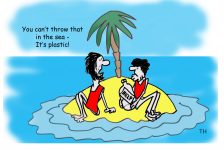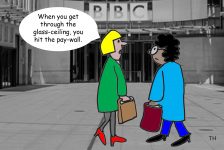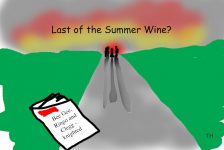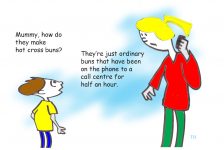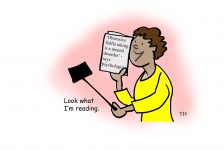My wife and I recently bought a television and for the first time in nearly 10 years we have a telly-screen in the house. We also bought a £147 licence, which in the UK is a legal requirement. The money goes to funding the BBC, and the licence is needed even if one never watches any of the BBC output.
Before our purchase we had occasionally caught up with television programmes in arrears via our laptops, but were very careful never to watch or record anything live, as that would have been illegal.
Nevertheless, for all the time we were telly-free, we were harassed by TV Licensing. They sent us a regular stream of letters which were all written on the assumption we were watching television illegally.
OFFICIAL WARNING, said one, ‘Our Enforcement Division has identified that there is no record of a TV licence at your address.’
By September 2009 we were told in red capital letters ‘OFFICIAL WARNING: WE HAVE OPENED AN INVESTIGATION.’
Clearly the investigation was not over-strenuous as the next letter arrived still addressed to The Legal Occupier. Indeed in all the years no one at the TV licensing office appeared to have made any effort to discover our names – which can easily be found from several public sources.
We gave up television when we moved house and somehow never got round to taking the set out of its bubble-wrap and box.
I kept a collection of the threatening letters which came in all sorts of shapes, sizes and colours. Some of the letters were polite, but most were threatening and sinister.
I never responded to any of the letters for two reasons. Firstly I was told that by informing TV Licensing that one doesn’t have a television does not stop the computer-generated letters arriving; and secondly, on their own admission, the licensing officials would be disbelieving saying ‘we may conform this with a visit. We do this because when we make contact… one in five people are found to need a TV licence.’
Many of the 40 letters we received were identical to previous ones sent, with just the date altered. There seemed no pattern to their despatch. In 2009 we received 15. There was no logic to their content. They do not start with a gentle warning, accelerating to threats of legal action. They appeared to be generated entirely at random.
We have had a letter saying ‘Address unlicensed, you could face prosecution and a maximum fine of £1000’. Only in the body of the letter was it admitted that licensing an address is not a legal requirement, unless one watches television live.
For any vulnerable or nervous person the letters could be very distressing. I have one that tells me ‘what to expect in court’ written in bold letters. It goes on to outline legal proceedings, despite the fact that they never started any.
I am told TV Licensing has no powers, without a warrant, to come into a home. Contrary to the myth they encourage, they have no detector equipment to snoop on anyone’s leisure habits from afar. The only weapon they have in their ‘battle’ against license evasion is harassment with the guilty and the innocent being accused equally.
No other public licensing body assumes my home needs a licence for any other activity unless I can prove otherwise. I am not harassed by officials demanding I show that I am not selling alcohol on the premises, or slaughtering animals or moving pigs. I have a driving licence, but no one calls to check.
Now we have a television. Was it worth buying? TV Licensing has stopped writing to us at last! We still only watch on catch-up, but since a change in the law we would now need a licence to do that as well. If my wife and I watch for an hour three times a week, that for us is excessive. Finding something worth watching is the hardest thing – apart, that is, from staying awake while the programmes are playing.
